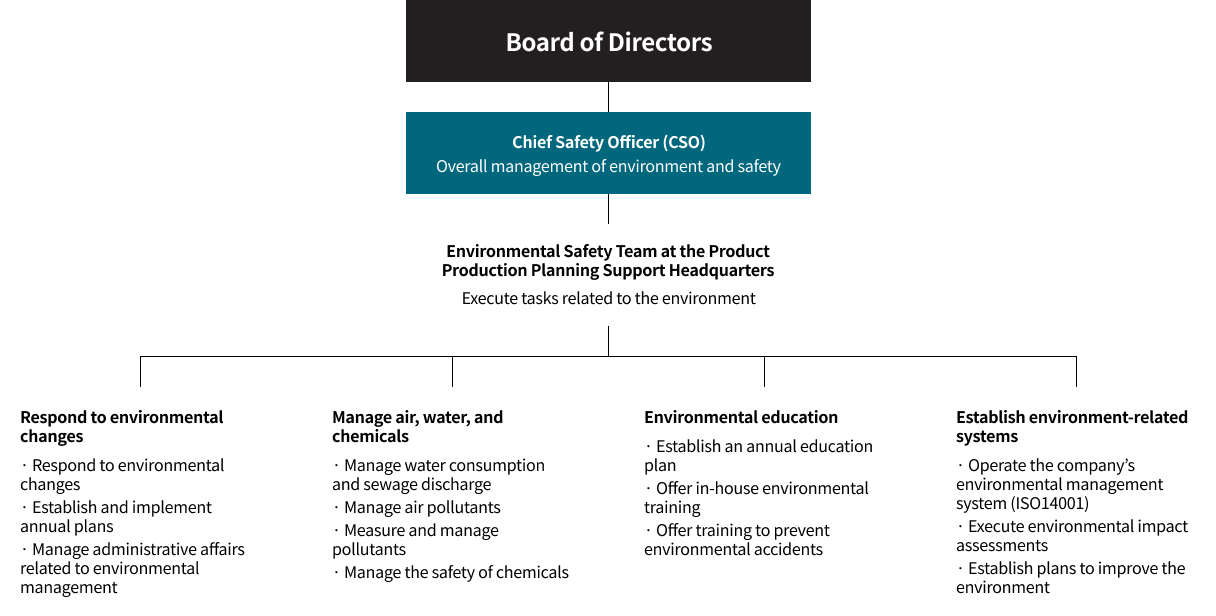 대동 DAEDONG
대동 DAEDONG
About CompanyESG Management
Creating environmental and social value with ESG management policies
- HOME
- About Company
- ESG Management
- ENVIRONMENTAL
Environmental management policy
As an expert manufacturer that designs, produces, and sells agricultural machinery, Daedong looks to minimize the environmental impact of pollutants generated during its business activities involving products or services, operates all business activities in an “environmentally friendly” manner by conserving resources, and the company complies with not only its internal standards, but also environmental laws, regulations, and requirements stipulated under ISO 14001. Moreover, Daedong is committed to achieving goals established under its environmental policy aimed at protecting the environment with continued environmental improvements. This policy makes sure that stakeholders, including the general public, can be aware of the company’s efforts, and Daedong periodically reviews and takes necessary actions to ensure that its environmental management system is understood by all employees and is also effectively implemented and maintained.
Environmental management system
In order to enforce environmentally friendly management practices more effectively, Daedong has been receiving reports on overall environmental issues and approving action plans through its Board of Directors since 2023, and has appointed a Chief Safety Officer (CSO) to assume final responsibility over matters pertaining to environmental management. The CSO establishes and manages the company's health, safety, and environmental policies. Moreover, the Environmental Safety Team, a group inside the company dedicated to environmental matters, understands and responds to environmental laws and regulations, and executes tasks required for environmental management, including environmental risk management for air and water quality, and it also makes preparations for ISO14001 certification.
Environmental management system and organization
Process to manage environmental laws and regulations
Support for the environmental management of partner companies
Daedong requires partners to sign an “Environmental Pollution Prevention Agreement” at the time of contract in accordance with internal and external management regulations in order to diagnose and evaluate the environmental management risks of partner companies. This Agreement contains practical principles for overall environmental management, including waste reduction, pollutant emissions, and environmental education. Furthermore, in the Partner Company Evaluation and Action Standards, the current state and practices pertaining to the management of hazardous substances are reflected in the evaluation of partner companies. Daedong identifies the degree to which environmental pollution is prevented and the capacity to prevent pollution at partner companies in line with company standards for environmental facility management. Results and pertinent information help Daedong select environmentally conscious companies as partners.
Environmental management risk diagnosis and evaluation process for partner companies
-
Contract
Sign an Environmental Pollution Agreement
-
Diagnostics
Identify the level of environmental management, including the availability of environmental facilities or equipment
-
Evaluation
Reflect environment-related assessment items such as the management of hazardous substances at partner companies
Management of chemicals and hazardous chemical substances
Daedong manages all activities (purchase, manufacturing, sales, after-sales service, etc.) applicable to the machinery and products it produces or sells in accordance with the new EU Registration, Evaluation, Authorization, and Restriction of Chemical (REACH) and EU Restriction of Hazardous Substances Directive (RoHS) in accordance with internal management regulations for hazardous substances. The environmental department at the company regularly reviews and lists the use of chemical substances, and also provides material safety data sheets for each chemical substance. Instructions for each work process that involves collecting chemicals are posted at appropriate locations, and training for workers handling said chemicals is provided by the company as well. Moreover, Daedong identifies hazardous chemicals by analyzing newly purchased chemical substances, replaces substances if they are deemed hazardous chemicals, and strives to keep the use of hazardous chemicals throughout its entire business operations at 0%.

Key environmental data
Violations against environmental laws and regulations
(Unit: case, KRW 10,000)
| Sort | 2021 | 2022 | 2023 |
|---|---|---|---|
| Violation | - | 11) | - |
| Fines and penalties | - | 60 | - |
1) The levied fines were immediately brought to the company’s attention (violation: failure to report changes to air emissions facilities), and efforts are being made to prevent the same issue from recurring in the future.
GHG emissions2)
(Unit: tCO2eq, tCO2eq/KRW 100 million)
| Sort | 2021 | 2022 | 2023 |
|---|---|---|---|
| Total emissions (Scope1, 2) | 16,594.66 | 16,407.98 | 16,775.09 |
| - Direct emissions (Scope 1) | 7,349.30 | 7,132.47 | 7,945.96 |
| - Indirect emissions (Scope 2) | 9,245.36 | 9,275.51 | 8,829.13 |
| GHG emission intensity 3) | 1.87 | 1.61 | 1.62 |
2) In 2021-2022, Daedong Group calculated the emissions from its Group headquarters, the Seoul office, and Vision Campus. In 2023, however, the Group added four of its regional headquarters to the list to make sure it tracks the emissions from every location across the country domestically.
3) Based on separate sales revenue
Energy consumption 4)
(Unit: TJ, TJ/KRW 100 million)
| Sort | 2021 | 2022 | 2023 |
|---|---|---|---|
| Total energy consumption | 316.33 | 312.81 | 312.43 |
| - Direct energy consumption | 123.14 | 118.99 | 127.94 |
| - Indirect energy consumption | 193.19 | 193.82 | 184.50 |
| Energy consumption intensity5) | 0.04 | 0.03 | 0.03 |
4) In 2021-2022, Daedong Group calculated the emissions from its Group headquarters, the Seoul office, and Vision Campus. In 2023, however, the Group added four of its regional headquarters to the list to make sure it tracks the emissions from every location across the country domestically.
5) Based on separate sales revenue
Water consumption 6)
(Unit: m3)
| Sort | 2021 | 2022 | 2023 |
|---|---|---|---|
| Total water withdrawal | 98,963 | 102,783 | 105,044 |
| - Service water | 5,916 | 9,423 | 11,359 |
| - Groundwater | 44,899 | 50,622 | 52,228 |
| - Industrial water | 48,148 | 42,738 | 41,457 |
| Total consumption | 58,062 | 64,971 | 70,934 |
| Total discharge | 40,901 | 37,812 | 34,110 |
6) Water data from Group Headquarters, Seoul Office, and Vision Campus
Waste discharge 7)
(Unit: ton, %)
| Sort | 2021 | 2022 | 2023 |
|---|---|---|---|
| Total waste discharged | 1,354.7 | 1,323.6 | 1,079.1 |
| General waste | 764.4 | 749.5 | 502.7 |
| - Landfill | 14.9 | 15.8 | 14.1 |
| - Recycle | 749.5 | 733.8 | 488.6 |
| Designated (hazardous) waste | 590.4 | 574.0 | 576.4 |
| -Landfill | - | - | 27.4 |
| -Incineration | 334.8 | 376.4 | 407.7 |
| -Recycle | 255.5 | 197.6 | 141.3 |
| Total recycling | 1005.1 | 931.3 | 629.9 |
| Total recycling rate | 74.2 | 70.4 | 58.4 |
7) Data includes Head Office and Daegu Factory waste discharge
Eco-friendly technology and investment
Daedong is striving to develop eco-friendly technologies to respond effectively to climate change and transform its business portfolio into a more eco-friendly one going forward. To date, the company has invested KRW 1.57 billion (cumulative) in the research and development of eco-friendly electrification, and another KRW 1.67 billion (cumulative) to develop technology and equipment for the cleanup of coastal areas. Additionally, Daedong spends approximately KRW 400 million per year to mitigate environmental risks and to improve relevant regulations and processes. In order to establish itself as a future agricultural platform company, Daedong carries out smart farming projects that present new standards for future agriculture using smart agricultural machinery, eco-friendly smart mobility, and forward-looking agricultural technology featuring ICT.
-


Smart agricultural machinery
More details -
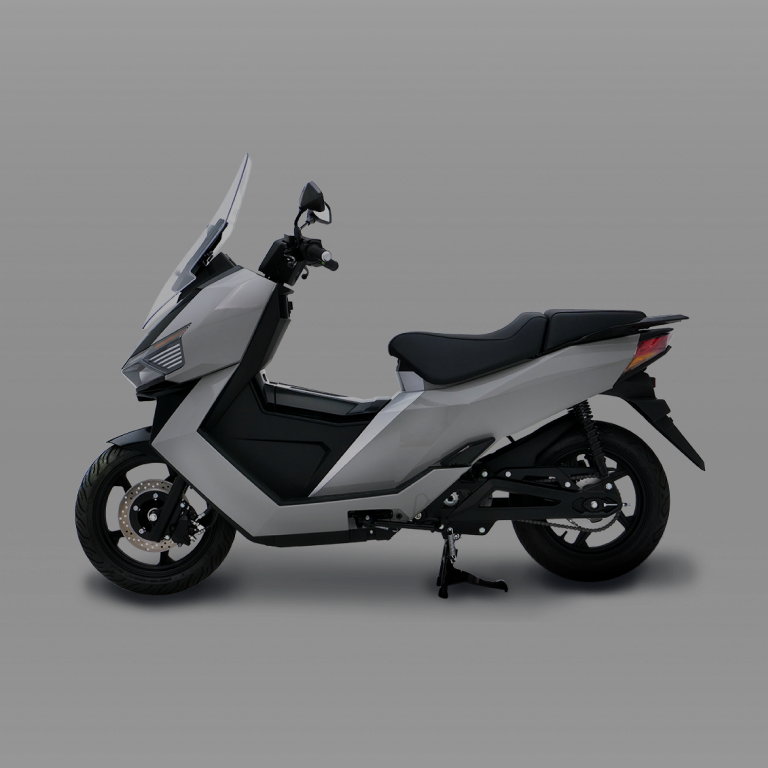
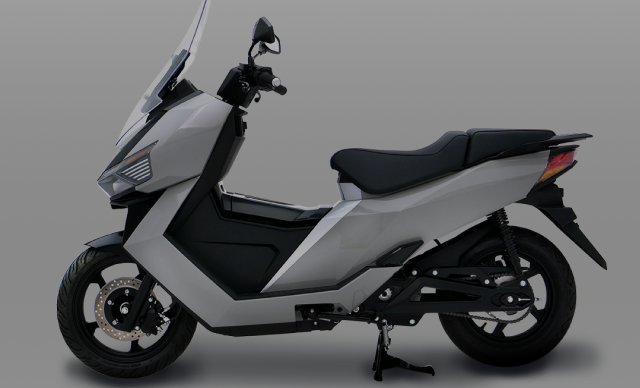
Smart mobility
More details -
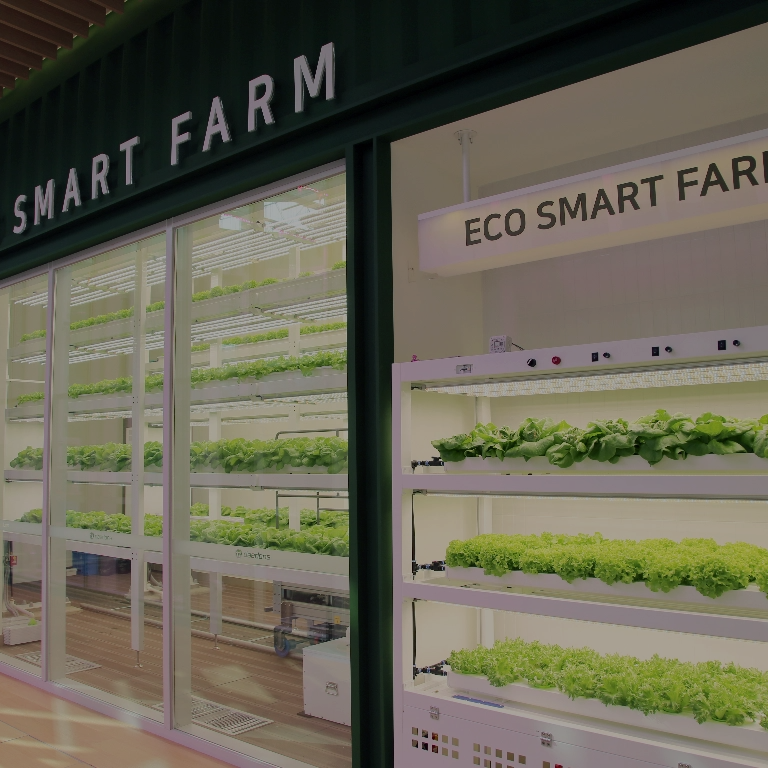
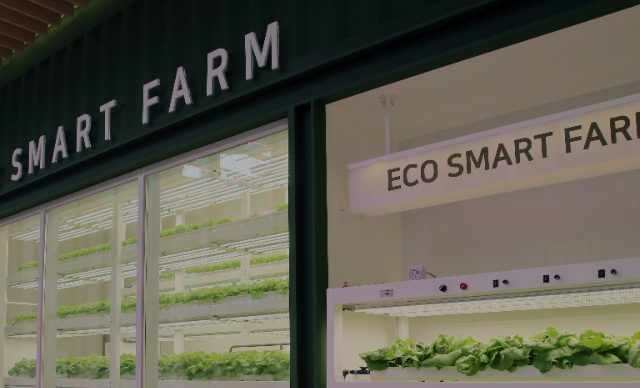
Smart farming
More details
Eco-friendly certification

ISO14001 certification
Daedong is certified under ISO14001 (Environmental Management System), an international standard, to practice environmental management.
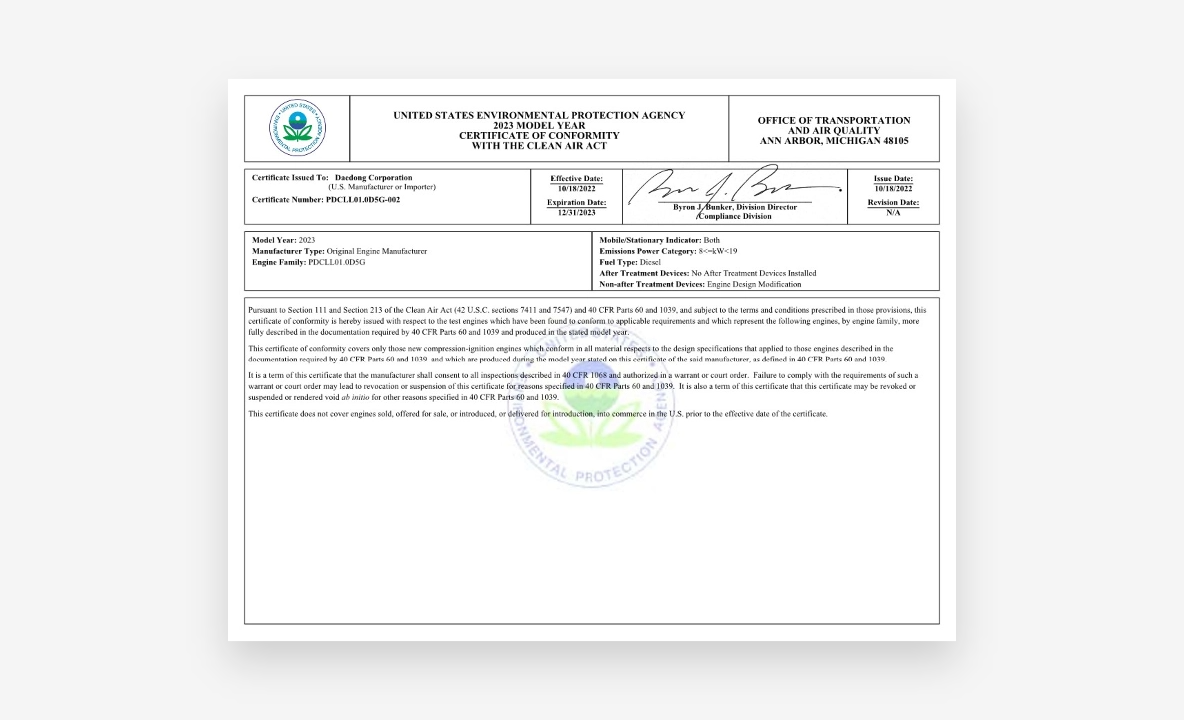
EPA/CARB/EU certification
The US Environmental Protection Agency (EPA), California Air Resources Board (CARB), and the European Union (EU) apply the world's toughest emission regulations (Tier 4 in the US, Stage V in Europe) to non-road engines to prevent air pollution and improve air quality. Daedong engines have been proven to be the world's best eco-friendly engines - they have passed rigorous emission tests in compliance with the US (EPA/CARB) 40CFR1039 and the EU Regulation (EU) 2016/1628.
Eco-friendly activities
-

Eco-friendly activities
-

Daedong Plogging initiative to protect the environment
